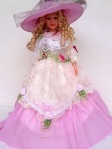 All regency heroines are virgins. It’s a standard trope. The only exceptions to this are widows and the very occasional courtesan. But mostly the regency heroine is untouched as the driven snow, no matter what her age happens to be. And thus the scene in which the hero discovers that he’s making love to a virgin is a common regency convention.
All regency heroines are virgins. It’s a standard trope. The only exceptions to this are widows and the very occasional courtesan. But mostly the regency heroine is untouched as the driven snow, no matter what her age happens to be. And thus the scene in which the hero discovers that he’s making love to a virgin is a common regency convention.
On the other hand, a virginal heroine in contemporary romance is, well, weird.
These days any contemporary heroine over the age of, say, twenty is presumed to have had some kind of sexual experience. Now she may not have had much, and it may not have been great, but she has to have had some or she’ll seem a little peculiar. If a writer decides for some reason that her heroine has to be a virgin, she also has to come up with a reason. The heroine is shy. She comes from a small town and was the twenty-first century version of a bluestocking. She has a really awful fashion sense. But there’s got to be an explanation for why the heroine maintained her virginity when all about her were losing theirs.
I’m sure some people find this particular strain in contemporary romance troubling. After all, thirty or forty years ago women were still expected to maintain their virtue until the wedding night, although, of course, their hubbies were supposed to have had enough sexual experience to be able to perform without a problem.
If I were still an academic, I might consider doing some research to discover just when this particular change took place. I’m pretty sure the virginal heroine was still the norm in the romances of the seventies and early eighties. But at some point, writers apparently decided to stop kidding around. The sexual revolution had already taken place. Clearly the virgin bride had become the exception, even if the bride had lost her virginity to her future spouse.
I’ve gotta say, as a writer of contemporary romances, I don’t find this much of a problem. In fact, the lack of the “losing her virginity” scene makes my life somewhat easier. Given that I already find sex scenes tough to write, I really don’t want to have to struggle with virginity too! And for those who are still upset about this, I recommend Inspirational romance. I’m pretty sure the virgin bride still reigns supreme there. But in other romance, as in real life, sexuality has definitely evolved. Only the regency heroine still gets to present her virginity on a platter to her thoroughly discombobulated partner.

